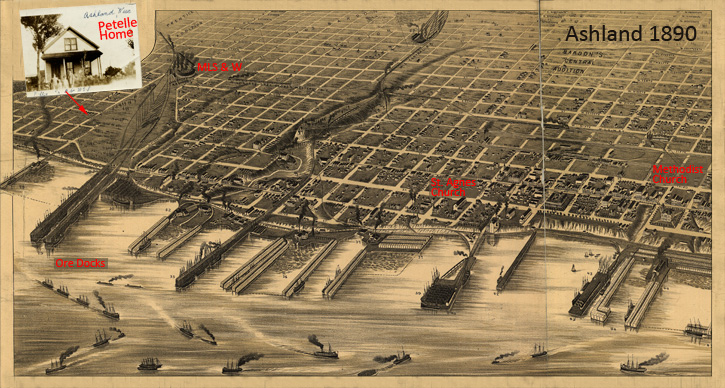The Move North.
Ashland, Wisconsin (1888-1895).
Accompanied by Joseph's brother Edwin, the couple took the train north to Ashland, located on the shores of Chequamegon Bay. Lumber was in demand in the treeless prairies to build cities and was sought by railway tycoons eager to secure timber for new train tracks. Blessed with a vast pine and hardwood forest, nearby iron ore deposits in the Gogebic range, "inexhaustible" brownstone quarries, and a good port off Lake Superior, the newly incorporated city of Ashland was very attractive to young men seeking good jobs.
Joseph's sister Hermine and her husband Noe Gervais had made the move earlier and they welcomed her siblings into their home where they lived with their five boys. Noe was a carpenter for the Milwaukee, Lake Shore & Western Railway (MLS&W). Joseph took a job as a car repairer likely working on flat cars in the large semi-circular building not far from his home. Short lengths of RIP tracks (an acronym for Repair, Inspect, Paint) led to bays in the repair shop. Edwin started as a wiper (wiping the excess grease and oil from the locomotive), but he did not last long in the north, and soon headed back to Milwaukee.
Their first child, Mable Mary, was born on April 21, 1889. Joseph became a storekeeper at the MLS&W shops, where it was his job to track the use of tools and other equipment issued to the workers.

Walter Petelle Born.
Our ancestor Walter Joseph was born on June 16, 1890. The Petelles had moved to their own home at 2113 East Third Street, pictured above, just around the corner from the Gervais'. Though the area had been platted, their house was a good distance from the city center in a sparsely built area, lending credibility to Walter's assertion that they lived "way out in the country" as he often told his grandchildren. Though it may have been a convenient walk for Joseph to the railway shop, a trip to town involved crossing a tangle of tracks which led out to the massive ore docks.
Fish was plentiful in northern Wisconsin's lakes and streams. In the surrounding forest strawberries, blueberries, cranberries and raspberries grew. Lula may have served her family the wild rice grown in the area and harvested by the Chippewa, or Ojibwe, on the Bad River reservation located just a mile or two from their home. Walter related tales to his grandchildren of Indians gathering on his front porch. They may have been looking for food, for their confinement on the reservation did not support their traditions of hunting and foraging. But their appearance standing on the porch was perhaps unsettling for his city raised mother home alone with small children.
- Craig Pfannkuche, Genealogical Archivist, C&NW Hist. Soc
- R. L. Polk & Co.'s Ashland city directory, (1888 through 1893)
- baptism certificate: Walter Joseph Petelle, First ME Church
- Memories of Walter J. Petelle
